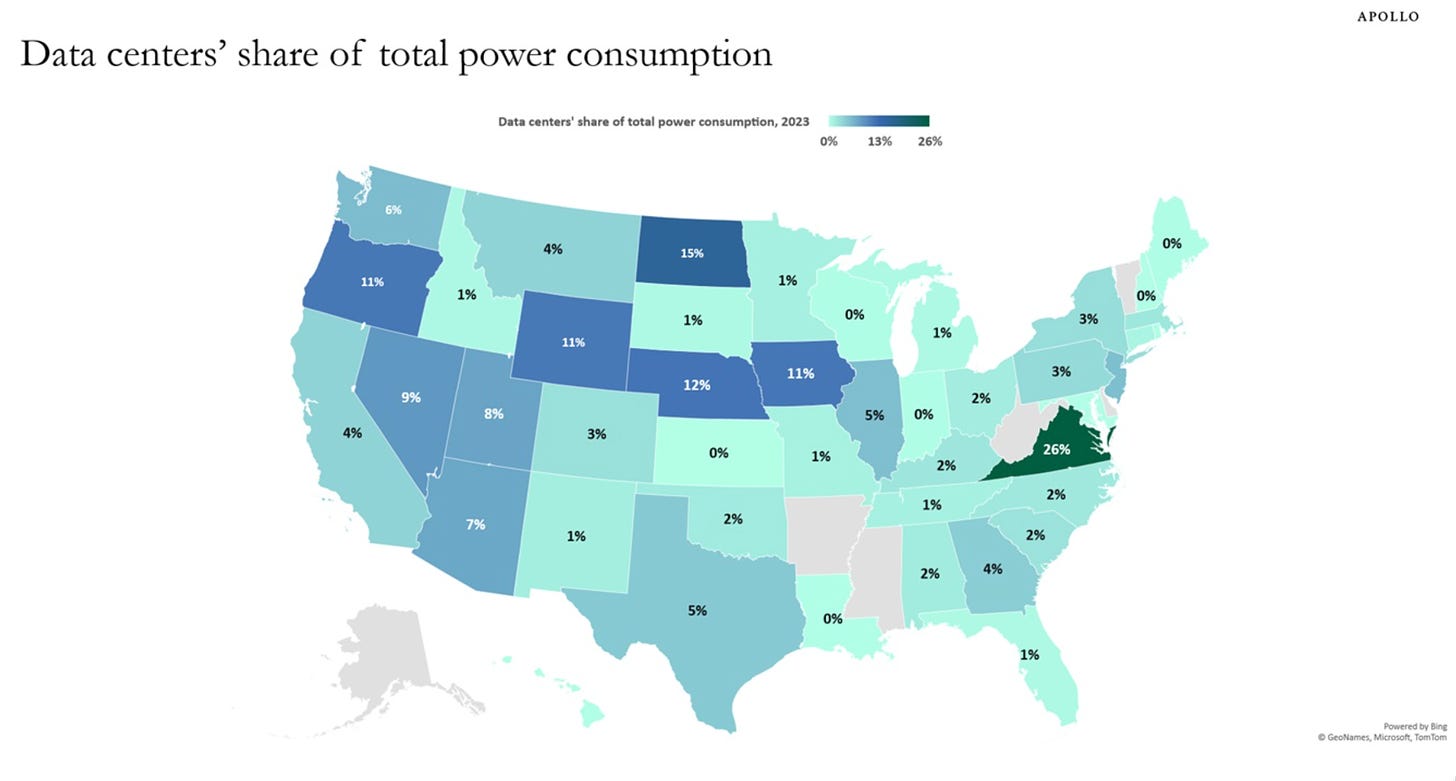My weekly read-around...
Donald Trump is not well at all; Ezra Klein on the NYT podcast paywall; Patrick Marren cheers for Nate Silver; my SSHA response to comments on "Slouching Towards Utopia"; Margaret Sullivan explain journalism to the simple Michael Barbaro; why Silver & co.'s "Silver Bulletin" is an essential read; I fail to write a coherent negative review of Nate Silver's new book "On the Edge"; weekly briefly noted for 2024-10-11 Th; Justin Wolfers on the AI-powered future of education; Why rubidium?; anti-core "insult" inflation; what has Donald Trump done to his make-up artists; data center power consumption; very briefly noted; & SubStack NOTES...
SubStack Posts:
The "New York Times's" Michael Barbaro wonders what's wrong with delaying until paragraph 11 and after the parts of a story about Donald Trump us[es dehumanizing language to describe... immigrants... as ‘animals’... [and are] poisoning the blood of our country... [evoking] the ideology of eugenics promulgated by Nazis in Germany and white supremacists in the United States...” And giving the story the anodyne headline "In Remarks About Migrants, Donald Trump Invoked His Long-Held Fascination with Genes and Genetics". As I say, grave moral fault attaches to all who boost the "New York Times". Grave moral fault
ONE VIDEO: Justin Wolfers: An Econ Educator's Guide to our AI-Powered Future:
Universities… focus on the shortcomings of AI, [but] students are focused on how to use it best (89% of them already do so). Economists usually argue that… [as] some types of work disappear[,] new types of even more productive work arise. We should… apply this…. AI can help in teaching is by achieving personalization at scale… [as] (1) a socratic tutor, (2) a practice exam coach, (3) a teaching collaborator, [or] (4) a text aggregator…
ANOTHER VIDEO: Why Rubidium? Angela Collier Explains:
Yes, you want to run your physics experiment on an alkali metal because its single-electron outer-shell configuration means its quantum-mechanical states are very hydrogen-like, and thus (approximately) solvable analytically in a way that no other atoms’ outer electron configurations are.
But why not one of the other alkali metals? Why not Lithium, Sodium, Potassium, Cesium, or (shudder) Francium?
There are only 30 grams of Francium in the world: it has a half-life of 22 minutes. There is 30 times more Rubidium in the earth’s crust as Cesium. Potassium eats your glass container away. Sodium and Lithium are harder and more expensive to laser-cool and confine while you keep the atoms from colliding with each other:
ONE IMAGE: Insult Inflation—the Anti-Core:
Found via Adam Tooze, via John Authers:
<https://www.bloomberg.com/opinion/articles/2024-04-10/inflation-anger-at-anti-core-still-burns-with-the-heat-on-biden>
ANOTHER IMAGE: No Professional Make-Up Artist Would Ever Allow a Client Out of the Chair Looking Like This!:
Would somebody please tell me what is going on?
YET A THIRD IMAGE:
From Torsten Slok: <https://www.apolloacademy.com/data-centers-share-of-total-power-consumption/>:
Very Briefly Noted:
Economics: Cosmopolites, assemble! Never mind that it feels a lot like we are Sisyphus and all the forces pushing for Globalization Retreat are Irresistible Boulder, and that, contra Albert Camus, we are definitely not happy:
Janet Yellen: ‘Calls for walling America off with high tariffs on friends and competitors alike or by treating even our closest allies as transactional partners are deeply misguided…. Sweeping, untargeted tariffs would raise prices for American families and make our businesses less competitive….We cannot even hope to advance our economic and security interests… if we go it alone… <https://www.bloomberg.com/news/articles/2024-10-17/yellen-warns-on-using-tariffs-to-wall-off-us-from-world-economy>
At the tip of the bullwhip, a crack: Software developers are going all-in on MAMLMs, hyperscalers are going all-in on buying chips on which to run training and inference for MAMLMs, chip designers are going all-in on designing future chips, foundries are working flat-out—but foundries are cutting sharply back on leading-edge capacity expansion, as they wait and see. Hence the order book of ASML:
Ian King: ASML’s Surprise Results Signal Uncertain Future for Some Chipmakers: ‘The Netherlands-based company… detailed bookings… of €2.6 billion ($2.8 billion) in the third quarter…. ASML’s giant machines, arguably the most important piece of equipment used by companies including Taiwan Semiconductor Manufacturing Co., Samsung Electronics Co. and Intel Corp., take months to build, install and qualify for production in chip plants that cost tens of billions of dollars. The operators of those facilities know that they need to be running that gear flat out, 24 hours a day, to give themselves a chance of making a return on the massive upfront investment…. The key takeaway… appears to be that optimism… among chipmakers is declining rapidly…. The news sent ASML shares down 16% in Amsterdam, the worst single-day decline in 26 years, and walloped other chip-equipment makers—KLA Corp. plunged the most in a decade at 15%, while Applied Materials Inc. and Lam Research Corp. dropped 11% each… <https://www.bloomberg.com/news/newsletters/2024-10-16/asml-s-surprise-results-signal-uncertain-future-for-some-chipmakers?cmpid=BBD101624_TECH>
Central Country: As long as nobody dares tell the Politburo Standing Committee that the problem is not low asset prices of equities and real estate, but rather the valid expectations of low future TFP growth that lead rational investors to those low asset prices, the Chinese economy looks to me more likely than not to continue to fall into its own special situation: A Middle Income Trap with Chinese Characteristics:
Robert Armstrong: How big is ‘big enough’ for China’s stimulus?: ‘It remains unclear what President Xi Jinping and his government want… to address the structural problems… to hit its 5 per cent GDP growth target this year… merely cosmetic… making China’s markets look more appealing[?]…. The ambiguity about what the government hopes to achieve, and what means it will use to achieve it, leaves only one option for serious investors interested in Chinese equities: wait and see. The backbone of any effective intervention in the economy or markets is clear communication. Without it, there cannot be investment, only speculation… <https://www.ft.com/content/06027987-d617-4060-8a9b-80e14d275359>The case that China is now in the position of going full-tilt for Brezhnevism—betting that consumption repression, large-scale government-funded R&D, and economies of scale will bring victory to Vladimir Lenin’s “socialism is soviet power plus electrification” in Lenin’s long struggle with Friedrich von Hayek. It does not seem wise, given history, to bet on Lenin here:
Yasheng Huang: ‘Looking at the three leadership generations…. The 1989 generation changed the rules/// essentially reversing the political reforms initiated by Zhao Ziyang. The 2002 generation, led by Hu Jintao, changed the game… strengthened government control… cracked down on social media… went quite far in controlling NGOs due to concerns about a potential Velvet Revolution. Xi Jinping changed the rules of the game again, this time reversing Deng Xiaoping… a more significant change… eliminating term limits, removing mandatory retirement, shifting away from economic growth… and moving away from cooperation with the West…. China has many positive fundamentals, including entrepreneurship, human capital, and globalization… However, I am indeed pessimistic about China under the current policy model. This model overemphasizes the supply side… places too much focus on industrial policy, high-tech development, and technological aspects while undervaluing grassroots entrepreneurship and bottom-up growth models… the curious combination of worrying about a Soviet-style collapse while prescribing a Brezhnev-style solution…. Xi Jinping and many Western observers agree… that it was the infrastructure, the power of the government to leverage data and financial resources, and the government’s organizational capabilities that delivered economic growth…. This view was pervasive among policy elites in China even before Xi Jinping, though Xi has taken it further by targeting the private sector as well. The fundamental problem with this view is that when China fully embraced it, Chinese productivity collapsed, even as GDP continued to grow rapidly for a while. But who cares about productivity when it’s not a number you see on TV every day?… <https://www.chinatalk.media/p/why-china-stopped-liberalizing>Public Reason: Very nicely put by Noah Smith! Also see John Holbo on: “Vavilovian Philosophical Mimicry… [a liberal-sounding] ideal [theory]… as protective concealment for [illiberalism]…. Let’s be blunt: you are a racist neo-Confederate. You can’t sell that, as such. But you can emphasize parts of it that sound kinda sorta more libertarian. Under Vavilovian pressure, white supremacy evolves, rhetorically, to outwardly resemble libertarianism±a philosophical crop plant—to ‘pass’ in environments in which outright expression of white supremacy would be weeded ruthlessly…” <https://crookedtimber.org/2019/12/03/vavilovian-philosophical-mimicry/>:
Noah Smith: Against Steelmanning: ‘It's usually not… good idea to… make arguments look stronger than they really are…. [For] a group of people who are all arguing in good faith, and everyone just wants to find the truth, this can be… fruitful… making sure you don’t accidentally toss out a good argument…. If you’re talking privately… and your goal is to persuade… this may sometimes be… effective…. Demonstrating intellectual charity will make someone more likely to listen… or it might not. But these are special cases… <https://www.noahpinion.blog/p/against-steelmanning>
The corrosive effect of “mercenary”-institution social practices in places where what society needs is, in Michael Polanyi’s terms, “fiduciary” institutions. But how to police in a society in which megaprofit is the only valid source of status and respect?
Graydon Saunders: ‘[Public reason] models require not having profit maximisation as a systemic norm. (If you're out to maximise your profit, of course you take money from fossil carbon extractors to say climate change is not that bad; in effect, demonstrating that you prefer your own death to the facts.)… I can imagine niche partitioning… for information aggregators ("what's going on?"), comprehension specialists ("what does this mean?"), and viewpoint interpreters. ("we like trees; what to think of city policy") But they would need to be clearly labelled and… to acknowledge that it would be, at best, a living. Once they start selling anything else all basis for trust is gone… <https://mastodon.social/@graydon@canada.masto.host/113312026907159367>The importance of staying in your lane. A very useful pep talk from the wise Steven Saideman:
Steven Saideman: Professing about Punditry: Calculating Value Over Replacement Pundit, Canada Edition: ‘One of the things I have been emphasizing in recent years is saying no to the media where my VORP trends negative or where I know folks who have much more value…. I have declined to speak much about balloons… election interference… China…. Who has negative VORPs, where a replacement pundit available off the street or waiver wire would be a significant improvement? I could name a few obvious retired senior military officers, but that would be unnecessary. I could also name some columnists for national papers in Canada including one who used to own a bunch of them before/after? he was convicted… <https://saideman.blogspot.com/2023/03/professing-about-punditry-calculating.html>Larry Kramer moves from Hewlett to the LSE in an attempt to actually get closer to where the intellectual rubber hits the road:
Larry Kramer: What Is Needed Is Hard Thinking: ‘Five major challenges facing the social sciences… around popular government, political economy, sustainability, inequality, and growth of new technologies…. The risk that we could lose even… minimal form[s] of popular government…. Neoliberalism is failing… [but recognizing that] does not require denying things it helped accomplish…. There are limits to how much nature can give to our efforts to create material wealth for ourselves…. Inequality… like cancer, [is] not one disease but many…. There are so many new technologies disrupting so many traditions and practices across so many domains, economic, social, political, and cultural… <https://www.lse.ac.uk/News/Latest-news-from-LSE/2024/j-October-2024/Kramer-lecture>Roman Empire: Why, anyway, did the Romans make Sicily a preaetorian provincia after -228, rather than simply collecting tribute on the one hand or on the other hand granting second-class Roman citizenship to some of the poleis, turning others into allies, and setting up Roman colonies?:
Fred K. Drogula: Commanders and Command in the Roman Republic & Early Empire: ‘Perhaps Rome did fear a resurgent Carthage… perhaps the quaestor… found… resources insufficient to suppressing piracy and brigandage…. The creation of two additional praetors[hips] in 227 BC… gave the concept of the provincia a quality of permanence that it had never had before…. Even Campania had ceased to be a provincia once it had been become a Roman possession, and the Romans had been content to dispatch civilian officials… <https://www.google.com/books/edition/Commanders_and_Command_in_the_Roman_Repu/XJ6_BwAAQBAJ>Virtual & Augmented Reality: I think that this from Mark Gurman is largely wrong. The point, as I understood it, of the Apple VisionPro was that it was a $3500 VR headset that simulated the sub-$100 AR glasses that we really wanted but did not yet know how to build at. Hence sell the VisionPro with as many of the capabilities of the future glasses as possible in order to get people started on building out software to figure out what the use cases for the product we think that ultimately we really want will be. And that process is now, creakily, moving forward.
FaceBook has built 1000 demonstration models of AR glasses that it could not sell as a product for less than $20000 each today. It is not selling them as a product. So how does that mean that getting VisionPro into the hands of potential developers is a bad idea? After all, what software is going to run on Orion-line devices besides Facebook and Instagram, if nobody outside the FaceBook corporate empire can get their hands on one?
As I see it, with an Apple Watch on your wrist and an Apple iPhone in your pocket, Apple will just—“just”—need to get you to buy the glasses when they become possible, while Facebook will have to get you to buy a neurallink wristband, a computation puck, and the glasses. Thus it will be hard for FaceBook to stay ahead of Apple in any future AR-glasses race. If there is one. The case for VR for gaming is clear. The case for VR for immersive experiences is clear.What the actual useful cases will be for AR and for “spatial computing”, if any, are much less clear:
Mark Gurman: ‘Meta CTO Sees New AR Glasses As Game Changing…. Meta’s masterstroke was the demonstration of its Orion AR glasses prototype… the closest thing we’ve seen to a pair of practical AR spectacles. …Apple… is going to need to accelerate its work—and fast… [or] risk losing out on a product category that could transform the way people use technology… <https://www.bloomberg.com/news/newsletters/2024-09-29/meta-steps-up-pressure-on-apple-vision-with-orion-ar-glasses-and-cheaper-quest-3-m1nkq76p?cmpid=BBD092924_POWERON>
















Feral Joe: he sounds pretty rational and in-control these days. Imagine that.
If the NYT., et al., really believed in good faith that the accelerating cognitive decline of the actually serving president were an existential threat, it would still be a threat even if he only has six months (now three-and-a-half) left in his term. So, where’s the wall-to-wall apocalyptic coverage of his continuing and accelerating decline? It makes a person wonder (not really!).
I guess it’s OK to leave his finger on the button for another six months, as long as he’s not running for reëlection.
Justin Wolfers: An Econ Educator's Guide to our AI-Powered Future
Note that we had the "conversation mode" of learning before there was printing. How did that go - poorly because knowledge will keep changing like the Chinese telephone experiment. If one naively assumes that current LLM technology would be accurate like the "Young Lady's {rimer", then fine. But LLM technology using transformers is not like that. It "hallucinates" - ie can talk BS. How can the receiver know what is true and what is not? For this model to work as a "conversation with a book", the responses must be accurate. The other issue is that reading the exact words of the author may be important. Where is the text ambiguous and weasel words and ambiguous phrasing used? Because a chatbot will hide this information to provide what sounds on the surface like an authoritative answer.
IMO, we could be better off with books that are written differently. Each chapter and section should have an abstract and the detailed material presented more in-depth, perhaps hyperlinked with local content and not in the cloud. Dynamic content with videos and charts that demonstrate changes rather than static images. Perhaps the content includes a video or audio reading of the material.
Dead tree books do have one great advantage today. They last a long time, Bit rot does not break the content (although holographic approaches would mitigate bit rot) and they survive technology changes that cause a "dark ages" of unrecoverable content.
Books with DVD (current storage technology) inserts are a compromise, but ideally restructuring a book to be more like a compilation of journal papers to aid reading would be preferable to SCI-FI fantasy AI talking books that try to answer questions you have about the book - questions you may not know how to ask to extract the true value of the contained knowledge.